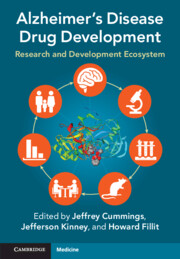Book contents
- Alzheimer’s Disease Drug Development
- Alzheimer’s Disease Drug Development
- Copyright page
- Dedication
- Contents
- Contributors
- Foreword
- Acknowledgments
- Section 1 Advancing Alzheimer’s Disease Therapies in a Collaborative Science Ecosystem
- Section 2 Non-clinical Assessment of Alzheimer’s Disease Candidate Drugs
- Section 3 Alzheimer’s Disease Clinical Trials
- Section 4 Imaging and Biomarker Development in Alzheimer’s Disease Drug Discovery
- Section 5 Academic Drug-Development Programs
- Section 6 Public–Private Partnerships in Alzheimer’s Disease Drug Development
- Section 7 Funding and Financing Alzheimer’s Disease Drug Development
- 41 Financing Alzheimer’s Disease Drug Development
- 42 Valley of Death and the Role of Venture Philanthropy in Alzheimer’s Disease Drug Development
- 43 Alzheimer’s Association Funding and Policy for Alzheimer’s Disease Drug Development
- 44 The Role of Philanthropy in Alzheimer’s Disease Therapeutic Development
- 45 National Institute on Aging’s Alzheimer’s Disease Translational Research Program: Diversifying the Drug-Development Pipeline for the Treatment and Prevention of Alzheimer’s Disease and Related Dementias
- 46 Alzheimer ’s Disease Drug Discovery and the Evolution of Start-Up Biotechnology Companies: Cognition Therapeutics, Inc. as a Case Study
- 47 Introduction to Venture Capital in Alzheimer’s Disease Drug Development
- 48 Federal Small Business Support for Small Businesses Pursuing Alzheimer’s Disease Drug Development
- Index
- References
48 - Federal Small Business Support for Small Businesses Pursuing Alzheimer’s Disease Drug Development
from Section 7 - Funding and Financing Alzheimer’s Disease Drug Development
Published online by Cambridge University Press: 03 March 2022
- Alzheimer’s Disease Drug Development
- Alzheimer’s Disease Drug Development
- Copyright page
- Dedication
- Contents
- Contributors
- Foreword
- Acknowledgments
- Section 1 Advancing Alzheimer’s Disease Therapies in a Collaborative Science Ecosystem
- Section 2 Non-clinical Assessment of Alzheimer’s Disease Candidate Drugs
- Section 3 Alzheimer’s Disease Clinical Trials
- Section 4 Imaging and Biomarker Development in Alzheimer’s Disease Drug Discovery
- Section 5 Academic Drug-Development Programs
- Section 6 Public–Private Partnerships in Alzheimer’s Disease Drug Development
- Section 7 Funding and Financing Alzheimer’s Disease Drug Development
- 41 Financing Alzheimer’s Disease Drug Development
- 42 Valley of Death and the Role of Venture Philanthropy in Alzheimer’s Disease Drug Development
- 43 Alzheimer’s Association Funding and Policy for Alzheimer’s Disease Drug Development
- 44 The Role of Philanthropy in Alzheimer’s Disease Therapeutic Development
- 45 National Institute on Aging’s Alzheimer’s Disease Translational Research Program: Diversifying the Drug-Development Pipeline for the Treatment and Prevention of Alzheimer’s Disease and Related Dementias
- 46 Alzheimer ’s Disease Drug Discovery and the Evolution of Start-Up Biotechnology Companies: Cognition Therapeutics, Inc. as a Case Study
- 47 Introduction to Venture Capital in Alzheimer’s Disease Drug Development
- 48 Federal Small Business Support for Small Businesses Pursuing Alzheimer’s Disease Drug Development
- Index
- References
Summary
Early-stage drug development efforts for Alzheimer’s disease (AD) therapeutics often occur within academia and start-up companies and are often supported by National Institutes of Health (NIH) funding. The National Institute on Aging’s (NIA’s) seed funding through the Small Business Innovation Research (SBIR) and Small Business Technology Transfer (STTR) programs provide innovators with non-dilutive funding that supports key early-stage drug developments. Since 2015, the NIA small business funding programs have become a valuable source of seed funding available that enabled start-up companies to reach critical value inflection points. This chapter includes examples of five companies that received NIA small business funding at the preclinical stage of development and advanced their innovations to clinical trials: AgeneBio, Alector, Avid Radiopharmaceuticals, Cognition Therapeutics and Tetra Therapeutics. The NIH and NIA have launched several strategic initiatives and funding opportunities to enable small businesses to reach key value inflection points.
Keywords
- Type
- Chapter
- Information
- Alzheimer's Disease Drug DevelopmentResearch and Development Ecosystem, pp. 533 - 543Publisher: Cambridge University PressPrint publication year: 2022



